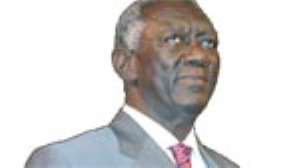
PRESIDENT JOHN Agyekum Kufuor ends his eight-year reign as President of the Republic of Ghana on January 7, 2009, when his successor takes office after the December 2008 elections.
He would then become the second president in the Fourth Republic to complete two terms of office, after former President Jerry John Rawlings.
For President Kufuor, the road to becoming the Number One Citizen has been tortuous, having contested for his party's flagbearership thrice, before being elected as president in December 2000.
Mr Kufuor declared his interest to occupy the highest office of the land - the Presidency - on the ticket of the New Patriotic Party (NPP) some 15 years ago.
In fact it had been very rugged, having failed to get the party's approval at the initial stages; but with resilience, he was able to capture the country's attention.
At the 1992 national congress of the NPP at the University of Ghana, Legon, his dream of becoming Ghana's president suffered a jolt, when he lost the flagbearership to the late Historian, Professor Albert Adu Boahen.
On April 20, 1996, Kufuor went into the race again and was this time nominated by 1,034 out of 2,000 delegates drawn from the then 200 constituencies at the NPP national delegates' congress, held at the University of Ghana, Legon.
Upon his election as the candidate of the NPP, the battle line was drawn between him and the incumbent President, Jerry John Rawlings, and after campaigning for less than nine months, Kufuor polled almost 40 percent of the popular votes to Rawlings' 57 percent in the 1996 elections.
On October 23, 1998, he was re-elected by the NPP as its flagbearer in Sunyani to face NDC's candidate for president, Professor John Evans Atta-Mills, whom he trounced in a keenly contested election in December 2000, breaking the myth surrounding the invisibility of Rawlings' NDC.
Mr. Kufuor, with over 30 years' public service record, garnered 48.4 percent in the first round of the December 7, 2000 presidential polls, while John Atta-Mills, Vice-President at the time, came second with 44.8 percent, a situation which called for a run-off.
On December 28, 2000, Mr. Kufuor was elected President of Ghana after bagging 56.9 percent of the votes in the run-off.
He was sworn into office as president on January 9, 2001.
President Kufuor once again floored John Evans Atta Mills, this time with a 'one touch' victory in the 2004 elections which gave him a second term in office.
Since his tenure as President of Ghana, the country has been ranked highly in terms of Good Governance, improved infrastructure and extraordinary economic development. His government has also made extraordinary progress in the fight against corruption, according to reports from various reputable institutions and the international community.
According to observers, Ghana has improved its civil liberty, government effectiveness and political stability. Apart from that, the ability of the government to formulate and implement both sound policies and regulations that permit and promote private sector development has also not gone unnoticed.
Based on the emphasis President Kufuor places on freedom of speech, the press and human rights in general, his political reputation has soared in the last seven years.
His government has also made tremendous strides in the improvement of the quality of life for the people.
With the introduction of the Citizens' Charter, which President Kufuor describes as his legacy, Ghana is ready to lift itself to its highest ranking ever in terms of quality of public and civil services.
His outstanding performance as President earned him a lot of respect on the African continent, culminating in his election as Chairman of the African Union on January 29, 2007 for the 2007-2008 AU sessions.
Ghana, under President Kufuor has also been at the forefront of the New Partnership for Africa's Development (NEPAD) and a strong advocate for closer economic ties with neighbouring states.
Observers have noted that he would, for a long time to come, be remembered for the general transformation of the economy, provision of infrastructure and security of the state.
Many of his economic policies, they claim, are expected to begin yielding results before he leaves office on January 7, 2009.
By Emelia Ennin




 Akufo-Addo commissions Phase II of Kaleo solar power plant
Akufo-Addo commissions Phase II of Kaleo solar power plant
 NDC panics over Bawumia’s visit to Pope Francis
NDC panics over Bawumia’s visit to Pope Francis
 EC blasts Mahama over “false” claims on recruitment of Returning Officers
EC blasts Mahama over “false” claims on recruitment of Returning Officers
 Lands Minister gives ultimatum to Future Global Resources to revamp Prestea/Bogo...
Lands Minister gives ultimatum to Future Global Resources to revamp Prestea/Bogo...
 Wa Naa appeals to Akufo-Addo to audit state lands in Wa
Wa Naa appeals to Akufo-Addo to audit state lands in Wa
 Prof Opoku-Agyemang misunderstood Bawumia’s ‘driver mate’ analogy – Miracles Abo...
Prof Opoku-Agyemang misunderstood Bawumia’s ‘driver mate’ analogy – Miracles Abo...
 EU confident Ghana will not sign Anti-LGBTQI Bill
EU confident Ghana will not sign Anti-LGBTQI Bill
 Suspend implementation of Planting for Food and Jobs for 2024 - Stakeholders
Suspend implementation of Planting for Food and Jobs for 2024 - Stakeholders
 Tema West Municipal Assembly gets Ghana's First Female Aircraft Marshaller as ne...
Tema West Municipal Assembly gets Ghana's First Female Aircraft Marshaller as ne...
 Dumsor is affecting us double, release timetable – Disability Federation to ECG
Dumsor is affecting us double, release timetable – Disability Federation to ECG
